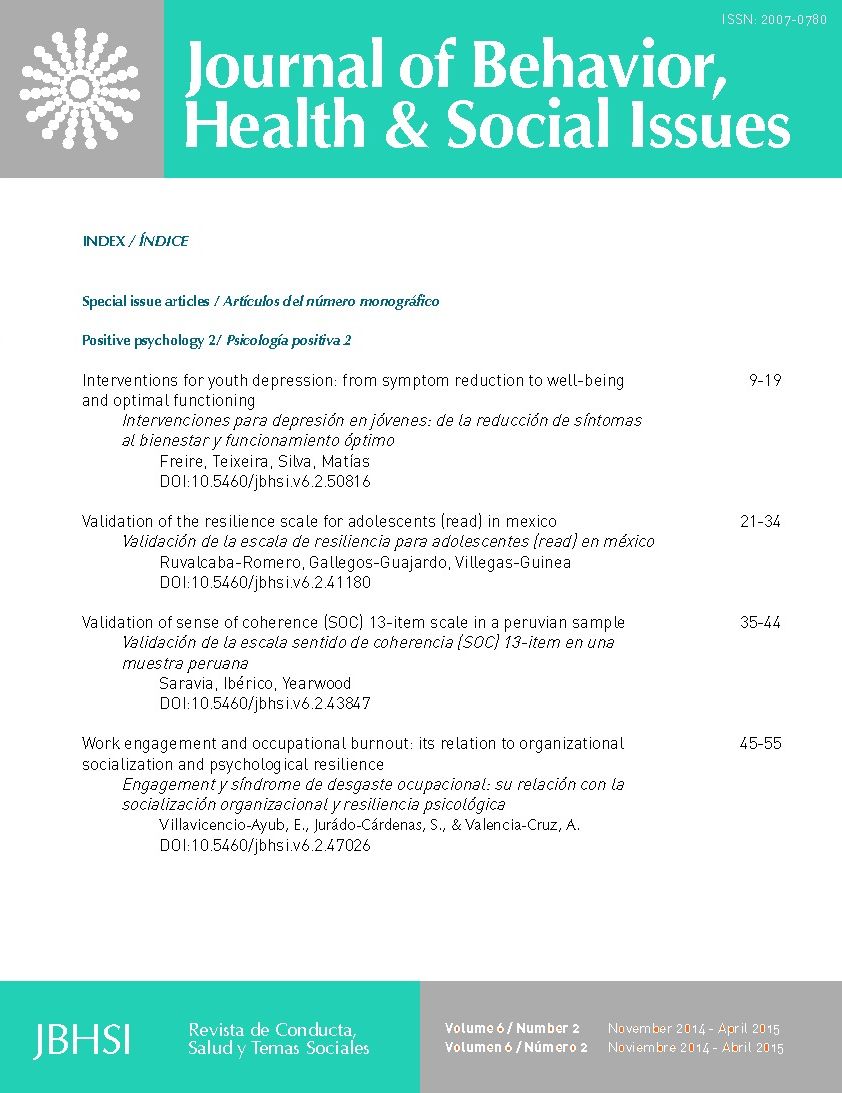Mindful eating and its relationship with body mass index, binge eating,anxiety and negative affect
Contenido principal del artículo
Resumen
Mindful eating concerns an awareness of our dietary habits, while its absence is typically associated with anxiety, negative affect and bingeeating. The objective of this study was to analyze these variables in a sample of 216 individuals, divided in four groups: students who practicedsport regularly, university athletes, yoga practitioners and persons suffering from obesity. They were assessed by a semi-structured interview andthe questionnaires MEQ, BES, PANAS and BAI. Statistical analyses included descriptive statistics, Pearson correlation, ANOVA and multipleregression. Results demonstrated that people who have less awareness of their eating habits are generally more overweight, more anxious and havehigher levels of negative affect, while they demonstrate less control over their eating habits. Moreover, these variables can predict binge eating.The model obtained was significant (p < .001) and its predictive capacity through R square corrected was .51. This means that the model predictsa 51% of binge eating from mindful eating, body mass index, anxiety and negative affect.
Detalles del artículo
Citas en Dimensions Service
Esta revista es de acceso libre inmediato a su contenido, bajo el principio de hacer disponible al público gratuitamente las investigaciones publicadas.
Los autores que publiquen en Journal of Behavior, Health and Social Issues (JBHSI) aceptan las siguientes condiciones:
- De acuerdo con la legislación de derechos de autor, en Journal of Behavior, Health and Social Issues (JBHSI) reconoce y respeta el derecho moral de los autores, así como la titularidad del derecho patrimonial, el cual será transferido —de forma no exclusiva— a la revista para su difusión en acceso abierto.
- La revista Journal of Behavior, Health and Social Issues (JBHSI) no realiza cargos a los autores por enviar y procesar artículos para su publicación.
- Todos los textos publicados por en Journal of Behavior, Health and Social Issues (JBHSI)
—sin excepción— se distribuyen amparados bajo la Licencia Creative Commons Atribución- NoComercial 4.0 Internacional, que permite a terceros utilizar lo publicado siempre que mencionen la autoría del trabajo y a la primera publicación en esta revista.
- Los autores pueden realizar otros acuerdos contractuales independientes y adicionales para la distribución no exclusiva de la versión del artículo publicado en Journal of Behavior, Health and Social Issues (JBHSI), por ejemplo incluirlo en un repositorio institucional o darlo a conocer en otros medios en papel o electrónicos, siempre que indique clara y explícitamente que el trabajo se publicó por primera vez en el Journal of Behavior, Health and Social Issues (JBHSI).
- Para todo lo anterior, los autores deben remitir el formato de carta de transmisión de derechos patrimoniales de la primera publicación debidamente requisitado y firmado, al momento de ser aceptado para su publicación el manuscrito en cuestión.
This is an open-access journal in terms of its content, under the premise of making published research available to the public for free.
The authors who publish on the Journal of Behavior, Health and Social Issues (JBHSI) accept the following terms:
- In accordance to the copyright law, the Journal of Behavior, Health and Social Issues (JBHSI) recognizes and respects the moral law of the authors, as well as the ownership right, which will be transferred –in a non-exclusive manner- to the journal for its open access diffusion.
- The Journal of Behavior, Health and Social Issues (JBHSI) does not charge the authors for sending and processing the papers for their publication.
- Every text published by the Journal of Behavior, Health and Social Issues (JBHSI) –with no exception- is distributed under protection of the Creative Commons Attribution 4.0 International license, which allows third parties to utilize what was published as long as they mention the authorship of the paper and the first publication in this journal.
- The authors can hold other contractual agreements, independent and additional to the non-exclusive distribution of the published version of the article in the Journal of Behavior, Health and Social Issues (JBHSI), such as including it in an institutional repository or promoting it through channels different from paper or electronic publications, as long as it indicates clearly and explicitly that the paper was first published in the Journal of Behavior, Health and Social Issues (JBHSI).
- For all the previous matters, the authors must refer the format of the letter of transference of patrimonial rights of the first publication, properly required and signed, at the moment of being approved for publication in the manuscript at issue.
